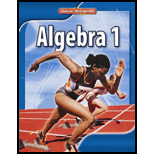
Concept explainers
a.
To calculate:
The probability that in a randomly chosen week there will be more than 20 deliveries
a.
Answer to Problem 6PPS
The probability for a randomly chosen week which have more than 20 deliveries is
Explanation of Solution
Given information:
Number of weeks having 0 to 5 deliveries is 0
Number of weeks having 6 to 10 deliveries is 9
Number of weeks having 11 to 20 deliveries is 18
Number of weeks having 21 to 25 deliveries is 12
Number of weeks having more than 26 deliveries is 13
Calculation:
The probability that a random chosen week has more than 20 deliveries can be calculated when number of weeks which have more than 20 deliveries is divisible by total number of weeks,
Therefore, the probability for a randomly chosen week which have more than 20 deliveries is
b.
To calculate:
The probability that a randomly chosen week have fewer than 21 deliveries
b.
Answer to Problem 6PPS
The probability for randomly chosen week have fewer than 21 deliveries is
Explanation of Solution
Given information:
Number of weeks having 0 to 5 deliveries is 0
Number of weeks having 6 to 10 deliveries is 9
Number of weeks having 11 to 20 deliveries is 18
Number of weeks having 21 to 25 deliveries is 12
Number of weeks having more than 26 deliveries is 13
Calculation:
The probability for randomly chosen week have less than 21 deliveries can be calculated when number of weeks having 20 or less deliveries is divisible by total number of weeks,
Therefore, the probability for randomly chosen student week have less than 21 deliveries is
Chapter 12 Solutions
Algebra 1
Additional Math Textbook Solutions
Elementary Statistics (13th Edition)
A Problem Solving Approach To Mathematics For Elementary School Teachers (13th Edition)
Basic Business Statistics, Student Value Edition
Calculus: Early Transcendentals (2nd Edition)
University Calculus: Early Transcendentals (4th Edition)
- Answer this questionarrow_forward1. vector projection. Assume, ER1001 and you know the following: ||||=4, 7=-0.5.7. For each of the following, explicitly compute the value. འབ (a) (b) (c) (d) answer. Explicitly compute ||y7||. Explain your answer. Explicitly compute the cosine similarity of and y. Explain your Explicitly compute (x, y). Explain your answer. Find the projection of onto y and the projection of onto .arrow_forward2. Answer the following questions using vectors u and v. --0-0-0 = find the the cosine similarity and the angle between u and v. འརྒྱ (a) (b) find the scalar projection of u onto v. (c) find the projection of u onto v. (d) (e) (f) find the scalar projection of onto u. find the projection of u onto u. find the projection of u onto and the projection of onto . (Hint: find the inner product and verify the orthogonality)arrow_forward
- Using f(x) = log x, what is the x-intercept of g(x) = log (x + 4)? Explain your reasoning. Please type out answerarrow_forwardThe function f(x) = log x is transformed to produce g(x) = log (x) – 3. Identify the type of transformation and describe the change. Please type out answerarrow_forwardEach graph below is the graph of a system of three linear equations in three unknowns of the form Ax = b. Determine whether each system has a solution and, if it does, the number of free variables. A. O free variables ✓ B. no solution C. no solution D. no solution E. 1 free variable F. 1 free variablearrow_forward
- Solve the following systems of equations and show all work.y = x2 + 3y = x + 5 Please type out answerarrow_forwardSolve the following system of equations. Show all work and solutions.y = 2x2 + 6x + 1y = −4x2 + 1 Please type out answerarrow_forwardDalia buys 20 collectible gems per month. Grace sells 10 gems from her collection of 120 each month. When will Dalia have more gems than Grace? Show your work. Dear Student If You Face any issue let me know i will solve your all doubt. I will provide solution again in more detail systematic and organized way. I would also like my last 3 questions credited to mearrow_forward
 Algebra and Trigonometry (6th Edition)AlgebraISBN:9780134463216Author:Robert F. BlitzerPublisher:PEARSON
Algebra and Trigonometry (6th Edition)AlgebraISBN:9780134463216Author:Robert F. BlitzerPublisher:PEARSON Contemporary Abstract AlgebraAlgebraISBN:9781305657960Author:Joseph GallianPublisher:Cengage Learning
Contemporary Abstract AlgebraAlgebraISBN:9781305657960Author:Joseph GallianPublisher:Cengage Learning Linear Algebra: A Modern IntroductionAlgebraISBN:9781285463247Author:David PoolePublisher:Cengage Learning
Linear Algebra: A Modern IntroductionAlgebraISBN:9781285463247Author:David PoolePublisher:Cengage Learning Algebra And Trigonometry (11th Edition)AlgebraISBN:9780135163078Author:Michael SullivanPublisher:PEARSON
Algebra And Trigonometry (11th Edition)AlgebraISBN:9780135163078Author:Michael SullivanPublisher:PEARSON Introduction to Linear Algebra, Fifth EditionAlgebraISBN:9780980232776Author:Gilbert StrangPublisher:Wellesley-Cambridge Press
Introduction to Linear Algebra, Fifth EditionAlgebraISBN:9780980232776Author:Gilbert StrangPublisher:Wellesley-Cambridge Press College Algebra (Collegiate Math)AlgebraISBN:9780077836344Author:Julie Miller, Donna GerkenPublisher:McGraw-Hill Education
College Algebra (Collegiate Math)AlgebraISBN:9780077836344Author:Julie Miller, Donna GerkenPublisher:McGraw-Hill Education





